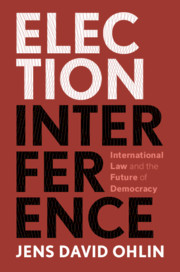Book contents
- Election Interference
- Election Interference
- Copyright page
- Dedication
- Contents
- Acknowledgements
- Introduction
- 1 What Is Election Interference?
- 2 Election Interference Is Not Cyber-War
- 3 Limits of the Sovereignty Framework
- 4 The Promise of Self-Determination
- 5 Foreign Electioneering and Transparency
- 6 Free Speech and Elections
- 7 The Value of Criminal Prosecutions
- 8 Soliciting Foreign Interference
- Conclusion
- Index
7 - The Value of Criminal Prosecutions
Published online by Cambridge University Press: 09 June 2020
- Election Interference
- Election Interference
- Copyright page
- Dedication
- Contents
- Acknowledgements
- Introduction
- 1 What Is Election Interference?
- 2 Election Interference Is Not Cyber-War
- 3 Limits of the Sovereignty Framework
- 4 The Promise of Self-Determination
- 5 Foreign Electioneering and Transparency
- 6 Free Speech and Elections
- 7 The Value of Criminal Prosecutions
- 8 Soliciting Foreign Interference
- Conclusion
- Index
Summary
The best antidote to the problem of foreign election interference is sunshine – inform the public about the nature and content of the foreign election interference. Criminal prosecutions play an important role in disclosing information to the public, as one part of a larger strategy of depriving foreign election interference of its effectiveness. This chapter focuses on the role that criminal prosecutions played during the Mueller investigation into Russian interference and how similar criminal investigations might be harnessed as a general response to election interference. Section 1 discusses how criminal investigations can help to keep the public informed about critical social problems – and the limitations of using the criminal justice system as a disclosure and transparency regime. Section 2 then analyzes the missteps made by the Obama Administration in failing to use criminal investigations to provide meaningful disclosure to the public about the scope of Russian information operations conducted over social media platforms. Section 3 focuses on recent changes to the Justice Department policies regarding disclosure of foreign influence operations. Finally, Section 4 looks at structural factors in the intelligence community to understand that community’s hesitation about relying on the criminal justice system, and how this reluctance might be overcome.
Keywords
- Type
- Chapter
- Information
- Election InterferenceInternational Law and the Future of Democracy, pp. 170 - 190Publisher: Cambridge University PressPrint publication year: 2020

